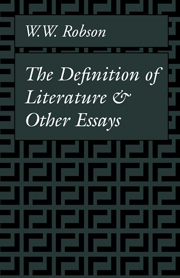Book contents
- Frontmatter
- Contents
- Preface
- Bibliographical note
- 1 The Definition of Literature
- 2 On Liberty of Interpreting
- 3 Evaluative Criticism, and Criticism without Evaluation
- 4 The Novel: a Critical Impasse?
- 5 The Sea Cook: a Study in the Art of Robert Louis Stevenson
- 6 On Kidnapped
- 7 On The Wind in the Willows
- 8 The Present Value of Tennyson
- 9 Robert Frost
- 10 Hopkins and Literary Criticism
- 11 T. S. Eliot: a Poet's Notebook
- 12 I. A. Richards
- 13 Yvor Winters: Counter-romantic
- Frontmatter
- Contents
- Preface
- Bibliographical note
- 1 The Definition of Literature
- 2 On Liberty of Interpreting
- 3 Evaluative Criticism, and Criticism without Evaluation
- 4 The Novel: a Critical Impasse?
- 5 The Sea Cook: a Study in the Art of Robert Louis Stevenson
- 6 On Kidnapped
- 7 On The Wind in the Willows
- 8 The Present Value of Tennyson
- 9 Robert Frost
- 10 Hopkins and Literary Criticism
- 11 T. S. Eliot: a Poet's Notebook
- 12 I. A. Richards
- 13 Yvor Winters: Counter-romantic
Summary
Recent attempts to make literary criticism more ‘rigorous’ have sometimes only succeeded in alienating it from many authors and readers. The discussions that follow are written in what I hope is plain and straightforward language. But I concede to the rigorists that plain and straightforward language can beg questions and gloss over problems, and I have tried to avoid this by being as fully explicit as possible about the standards, criteria, and methods which I favour. I believe that this is the only permissible way of arguing about literary questions at a time when there is so much disagreement about matters of principle.
The first four essays deal with general questions. In ‘The Definition of Literature’ I have attempted, not to fix on a specific formulation, but to decide what kind of definition is preferable. ‘On Liberty of Interpreting’ examines the much-canvassed question of the relevance or otherwise of authorial intentions to criticism. Its purpose is to bring out what seems true in both ‘intentionalism’ and ‘anti-intentionalism’, and to discard what in both seems false. ‘Evaluative Criticism, and Criticism without Evaluation’ argues that one widely favoured account of literary appraisal is in fact empty. ‘The Novel: a Critical Impasse?’ raises a general problem about prose fiction. It may serve as an introduction to the three following essays, which discuss some famous novels in detail. A contrasting kind of approach is used in the essays on Tennyson and Frost, which survey a writer's work as a whole.
- Type
- Chapter
- Information
- Publisher: Cambridge University PressPrint publication year: 1982



